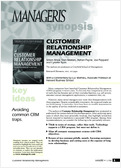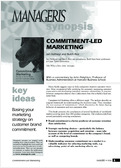Building a resilient brand

Some brands are capable of developing a type of resilience. Although they cannot avoid crises, they know how to bounce back in adversity thanks to their privileged relationship with a core set of loyal customers. How do they go about it?
Nowadays, no organization is protected from reputational risk. In an age when everything becomes known and everything is circulated over the Internet in a few clicks, the smallest error can have serious consequences. Inappropriate behavior, a decision that is not correctly understood, an infringement of the company values… and the image of the company suffers. In 2017, United Airlines is caught in a storm. An overbooked passenger is ruthlessly expelled from the plane by the crew. The video of the altercation, filmed by another passenger, spreads around the world in a few hours. The stock value of United Airlines drops by 800 million dollars. Ill managed, the impact of such a crisis can be devastating—and long-standing! According to a survey conducted by the market research firm YouGov in 2017 in the United Kingdom, 67% of the people who decide to boycott a brand then stop ever consuming it again.
Even if difficult to avoid, crises are not always irreversible. According to the same survey, 79% of the people interviewed stated that they would continue consuming a brand that they like, even if it were going through a difficult time. The best guarantee against far-reaching damage to a company image would thus be the attachment of its customers.
How do resilient brands succeed in building these loyalty bonds? It cannot be improvised at the last minute once the crisis has happened. You must consider a relationship with your customers that extends beyond the strict commercial framework. Exchanges cannot be reduced to a conventional transaction between supplier and consumer. It is about banking on shared values, on a story built over time; about maintaining regular interactions with the customers; about helping them reach a significant objective in their life, without this necessarily converting into a sale. It is also about accepting a potential crisis as a useful step in the relationship: you must then listen to the critiques and take them into consideration. The approach has a price, indeed, but its outcome is priceless: being able to count on the support of your loyal customers in the event of harsh blow.
In this synopsis:
– Communicate effectively in the event of crisis
– Invest in the relationship with your customers to better resist image crises
– Prepare your staff for the onset of a reputational crisis
SubscriberSign in
to download
the synopse (8 p.)
VisitorI want to buy
this synopsis (8 p.)
VisitorI want
to subscribe
See also

Liberating the company: returns of experience
The notion of liberated company remains controversial: some see in it an ideal model, others a deception. In any event, it raises a key question: how can you combine individual autonomy and collective efficiency?

